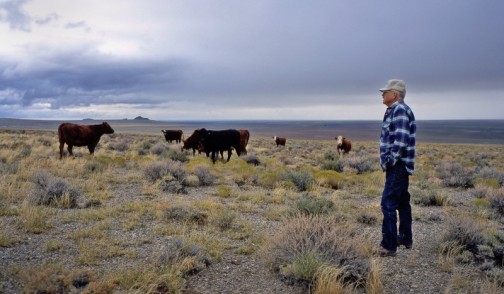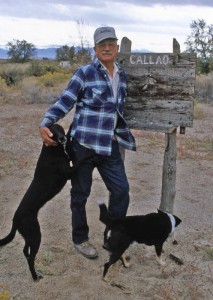Into each and every life there comes a defining moment. For Cecil Garland, that moment came 35 years ago on a quiet evening just when it seemed everything in his life was perfect. Cecil was reading a bedtime story to his young daughter Bertha Mae; his wife Annette was in the kitchen washing dishes. From a distant ridge a chorus of coyotes was singing a salute to yet another breathtaking desert moonrise.
Then came the news over the radio. Something about the U.S. Air Force.
“They said they was gonna build a vast missile complex in the West, but it hasn’t been decided where,” Cecil recalled.
“And I says, ‘Mom, did you hear that? Them sonsabitches are gonna build a missile complex right HERE!”
“And she says, ‘Well, you’re gonna fight ‘em.’”
Fight them he did, and in the process the Western Utah cattle rancher became a plain-spoken champion for truth, justice and the American way. Think Cliven Bundy, except not stupid. Nor armed. Cecil didn’t carry a gun. Words are more effective—if, like Cecil Garland, you know how to use them.
And let’s face it: the notion of basing 200 intercontinental missiles in the Great Basin was the height of cold war lunacy. Supposedly, the missiles would avoid detection by Russian satellites by shuttling between reinforced concrete bunkers along vast racetracks. Each and every valley across Western Utah and Central Nevada would be home to such a racetrack. In all, there would be 4,600 bunkers, and unless the Ruskies were to blow up each and every last one of them, we’d still be capable of retaliation. It would be the shell game from hell.
Pretty soon the Air Force began holding public ‘briefings’ regarding the proposed MX project. I attended several. It was like watching “Doctor Strangelove,” except that it wasn’t a movie. It was real! When I wrote to express my dismay, the Air Force delivered to my door a 13-volume “environmental impact statement” that pooh-poohed the possible negative environmental impacts of the system. Life would go on pretty much the same as before, except that everything that moved out there would be under constant surveillance. That would include Cecil’s battered Dodge pickup, his two dogs, his cows, his wife Annette and the fifteen children she taught at Callao’s one-room schoolhouse—and probably me, who at the time was roaming the area in a vintage VW bus and had already been taken prisoner once by the Air Force—during Red Flag maneuvers.
In other words, the Great Basin would be just one big military reservation—which it almost is already. Happily, there are still places, such as the Deep Creek Mountain Range, where a person can pretty much get away from it all. And that’s exactly what Cecil and Annette were looking to do when they settled in Callao back in 1973.
“I always had in mind that there would be a place where wildlife and ranching would be compatible and exist side by side, and I’ve never lost that idea,” he told me. “It’s been part of our dream, my wife and I, that that’s the way it would be on our place. So the first question we asked ourselves was how can we make a modest profit on this range, and allow it to improve in the process? And we decided if we couldn’t do that, we’d quit. We wouldn’t abuse the land—we didn’t want to do that—and we have been successful to the point where I’m conceited about it. And each morning I get up and pray to God—at least through my lifetime—that it won’t change. Because when it does, when the wildness is gone and the wilderness is all gone from the area, then there won’t be any reason for me to want to ranch here. So to me, it’s just a kind of a passion, an innate love of this planet, and of being a part of it. Living here has been a beautiful experience.
It’s a great life.”
Cecil Garland died this week, at the age of 88 after a short bout of pneumonia. Did he go quietly? Well, no—he was in the process of fighting still another crazy idea, a plan to suck the groundwater out from under the West Desert in order to satisfy the thirst of a growing Las Vegas. On the weekend of September 7, a celebration of Cecil’s life will take place in Callao, in conjunction with a meeting of the Great Basin Water Network, which is determined to carry on Garland’s crusade to save what’s left of the wild world he so dearly loved.

